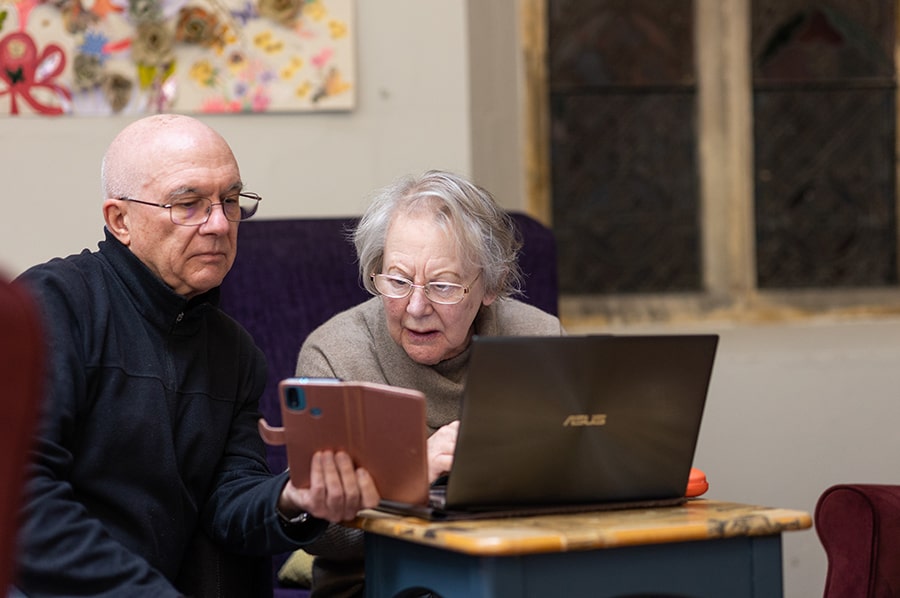Commissioners and suppliers invited to complete survey to improve digital clinical safety for patients

A survey is seeking the views of commissioners and commercial suppliers that develop, deploy, procure, or evaluate AI/Internet of Things (IoT) technologies to be used with older users at home in England.
The research, entitled ‘Digital Clinical Safety for Older People accessing Adult Social Care Occupational Therapy Services: A survey of commissioners and commercial suppliers of AI/IoT technology’, is being conducted by Alicia Ridout.
Alicia is a PhD student at York St John University and a registered occupational therapist. Alicia’s work is supervised by Professor Alison Laver-Fawcett, Professor in Occupational Therapy at York St John University.
The research is centred around the opportunity to improve digital clinical safety during the referral and assessment phase of occupational therapists’ (OTs’) work, improving personalised care and support choices.
The context for the survey is that the COVID-19 pandemic and the cost-of-living crisis have added many more complexities to people’s lives. They triggered a huge increase in the use of complex technology. Additionally, occupational therapy services and carers are facing increasing demand, and the UK has an ageing population.
Technology used by OTs often has AI embedded in its software. When devices are connected via the internet (IoT), it can involve complex self-learning software making predictions and triggering, for example, a service to respond to a person’s wellbeing needs. If an older person is referred or self-refers to adult social care occupational therapy services, they potentially have the opportunity to use these technologies.
It can be complicated, due to the way AI and IoT are created, to work out if they are safe for individuals.
For many older people facing a significant change in their daily lives, an occupational therapy assessment is important for helping them to achieve their goals and aspirations. Examples might be smart/AI technology and systems to help manage health, heating, or security (environment); using devices such as an Alexa and other sensors; or information underpinned by Large Language Models such as ChatGTP/Bart.
When used in health and adult social care, these types of technology are highly regulated. OTs are also regulated by the Health and Care Professions Council and must demonstrate clear clinical risk management in their practice, especially as many AI/IoT technologies are also medical grade devices.
Adult social care services are still the focus of policy drivers to deploy AI. This research aims to support the profession as it enters this phase of service development. OTs assess the physical, psychological, social, environmental, and cultural factors that can influence wellbeing and balance the risks and benefits of different courses of action and technology. This includes technology that is using AI or connected internet devices.
Alicia’s research looks at what can be done to make conversations on this topic easier, considering the risks and benefits such advanced technology might involve. This emerging field is still lacking practice guidance.
Commercial and commissioner experiences are key to helping OTs understand the whole picture.
The survey results are designed to clarify OTs’ understanding of potential digital risks and help to codesign future improvements, using collaborative, experience-based codesign.
The findings will also provide a ‘real world’ baseline for further research, using experience-based co-design to collaboratively create new practice resources, improving digital safety conversations.
It is hoped to create some best practice tools to be used by older people and OTs in the future.
Now, the survey wants to hear from companies and commissioners that deploy, develop, procure, or evaluate AI/IoT solutions to be used with older users at home in England.
Ideally survey respondents will be:
- A commissioner designing and procuring adult social care AI/IoT based technology supplies that may be used by community/adult social care OTs to support older adults/or for system-based services which would include this population, or
- A commercial organisation designing, developing, testing, and deploying AI/IoT based technology in adult social care services where it is used with older adults (including in pipeline development), or
- A commercial organisation designing, developing, and deploying AI/IoT based technology services where it is used with older adults that may purchase directly from the firm
The deadline the survey is 24 November 2023. Most of the questions are tick boxes, and it should take approximately 15 minutes.
Commissioners and commercial suppliers can complete the survey here.

